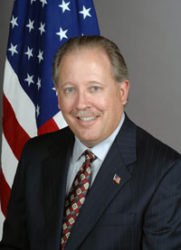CARACAS/WASHINGTON, (Reuters) – The U.S. government sent veteran diplomat Tom Shannon to Venezuela yesterday to meet senior opposition and government figures amid a brutal economic crisis and political impasse in the South American OPEC nation.
Socialist-run Venezuela has for years had tumultuous relations with Washington, and a similar rapprochement led by Shannon stalled last year over the jailing of opposition leader Leopoldo Lopez.
Despite a harsh exchange of words at a summit in the Dominican Republic last week, U.S. Secretary of State John Kerry and Venezuelan Foreign Minister Delcy Rodriguez agreed to re-start talks in an effort to reduce tensions.
In a visit lasting less than 24 hours, Shannon, a veteran of U.S. diplomacy in the region who is an under secretary in the State Department, was to meet first with opposition leaders. These included congress head Henry Ramos and two-time presidential candidate Henrique Capriles, according to opposition sources.

He was then hoping to meet President Nicolas Maduro, the former bus driver who is half-way through a six-year term after winning election in 2013 to succeed his mentor Hugo Chavez.
“The main purpose is to have a series of discussions about the social, economic and political challenges in Venezuela and to try to help foster constructive, meaningful dialogue toward solutions with a variety of groups in the government and outside,” said U.S. State Department spokesman John Kirby.
Washington may be hoping a rapprochement undermines Maduro’s constant blaming of his “imperialist” foes for Venezuela’s economic demise and alleged coup plans against him.
Shannon is likely, analysts and diplomats said, to press for the release of jailed opponents including Lopez, and he has also publicly backed the opposition’s push for a referendum to try and recall Maduro this year.
“The United States understands that for a recall referendum to take place, international engagement is necessary,” said Venezuela expert David Smilde, of Tulane University.
In a speech yesterday, Maduro welcomed Shannon and also repeated his calls for talks with his domestic foes.
“I think it’s very good the right steps are taken to rebuild relations with the United States,” he said. “And I would equally want processes of dialogue … with Venezuela’s opposition.”
Both Ramos and Capriles have said dialogue is a time-wasting tactic employed by Maduro in the past, and the only solution for Vene-zuela now is a referendum. The government has said there is no time to organize a referendum this year, and the national election board has been dragging its feet over the process.
The timing is crucial because if Maduro loses a referendum this year, there would be a new presidential election which polls indicate he would likely lose. Losing a referendum after January means he would be replaced by his vice president, effectively leaving the Socialist Party in power.
Though he benefited from Chavez’s popularity and generous welfare programs to win narrowly in 2013, Maduro’s popularity has plummeted amid recession, the highest inflation in the world, shortages and now daily lootings and food riots.
The opposition won control of the National Assembly in December due to public ire over the economy, but a conflict of powers has ensued and a government-leaning Supreme Court has overturned most of the legislature’s measures.
Since Chavez began office in 1999, Venezuela and the United States have gone through cycles of diplomatic fighting followed by generally short-lived eras of reconciliation.
They have been without ambassadors since 2010.
Through it all, Venezuela has kept oil flowing north uninterrupted, and is the third biggest U.S. supplier after Saudi Arabia and Canada, according to latest U.S. data.





